- Home
- Taylor Caldwell
Your Sins and Mine
Your Sins and Mine Read online
EARLY BIRD BOOKS
FRESH EBOOK DEALS, DELIVERED DAILY
LOVE TO READ?
LOVE GREAT SALES?
GET FANTASTIC DEALS ON BESTSELLING EBOOKS
DELIVERED TO YOUR INBOX EVERY DAY!
Your Sins and Mine
Taylor Caldwell
Everywhere in the world, the
land refused to bear fruit …
The sun shone cloudless in the sky and the rivers dropped and the seas shrank and the creeks and brooks dried up and the mountains were sear and the valleys yellowed all over the world.
The land hated us, the violated land, the faithful land, the exploited and gentle land. The land decided that we must die, and all innocent living things with us.
The land had cursed us.
Our wars and our hatred—these had finally sickened the wise earth.
We did not know then that we stood indicted as the irreconcilable enemy of all life.…
CHAPTER ONE
My father was no different from other men; he had the wisdom of hindsight. He was also a countryman, and had never been far from the place where he was born, and had always lived close to the earth. So when he told us later of what he had seen in early January—a few months before the strange and awful things had come to pass—we discounted it as superstition, for he was what used to be called a “fundamentalist.”
“Yes,” he would say somberly, “it was because all of us everywhere in the world were really strangers—hating strangers—every man to his neighbors and every nation to other nations. It was necessary for us to be punished so that we’d finally see the light. ‘For then shall be great tribulation, such as was not since the beginning of the world to this time, now, nor ever shall be.’ Matthew 24:21.” My father knew his Bible almost by heart.
During the years when the nations of the world stood poised, armed and terrified and hating, my father used to quote Matthew 24 almost daily. His voice would take on an ominous note new to him, for he was naturally a simple and optimistic man. The seasons never failed; God never failed. The sun swung in its fiery orbit, and the green tides of the world rose and fell with it, under the hand of God. That was my father’s serene faith. But after the first atomic bombs fell, and the hatred of men became more fierce and more insane, and the hydrogen bombs were invented, then my father’s faith in man began to fail.
He was in his middle fifties that January, strong, almost monolithic in stature, ruddy and zestful and full of roaring laughter. He was a graduate of one of the best agricultural colleges in the country, and was known as a student of world affairs. He had once served as mayor of Arbourville Township, and no one I have ever known, before or since, was more aware of what was happening in the world. No, my father was not senile that January, nor was he a few months later when he told us of what he had seen.…
Unable to sleep one night, he went out of the house silently, and stood smoking on the hard and frozen brown earth. He had remarked a week before that we had had practically no snow, and this had made him uneasy. But he was certain that this was just another of those vagaries of nature which always plague a farmer’s life.
He told us that it had been a very calm, starry night, heavy with stillness. But it was not the customary stillness of a country midnight. It held an ominous quality, as if waiting for something enormously strange to happen. A farm midnight has its own familiar sounds: a horse will neigh, a cow complain, a sleeping dog bark, chickens flutter and flurry in their sheds. Life, though sleeping, is still alive.
My father smoked, his heavy, plaid jacket buttoned to his neck, his feet spread apart on the brown earth in his usual sturdy fashion. It was some time before he became aware of the absolute silence all about him. The barns might have been empty, the fields uninhabited, the woods abandoned. The house behind him held all of us, sleeping, its big whiteness glimmering under a moon that was so bright my father could see the east meadow, where the winter wheat was already green; he could see the woods, the bare black branches of the trees snarled together. He could see the brook which ran like quicksilver, unimpeded by any ice, beyond the barns. And here and there he could see a farmhouse window where a single light shone, testifying to birth or illness.
We should have had snow by now, a lot of it, thought my father. We should have had it in November and December. He looked at the sky again, crowded with stars, and at the great white moon. He studied it all with a countryman’s wisdom, searching for a single cloud. It was cold enough for snow; it was very cold.
He recalled that, according to the farm journals, lack of rainfall and snow was causing farmers all over the country considerable uneasiness. No rain of any importance in the South; Texas was drying up. The mighty plains of Iowa and Idaho and Kansas were reporting an alarming lack of moisture of any kind since the first of November. But still, thought my father, this has happened several times in my lifetime, and just when it is needed most desperately rain or snow comes and the crops are in and there’s a good harvest, generally.
He was still uneasy, though, and he scowled up at the dry stars and the dry moon. The smoke from his pipe curled up before his face, straight as a stick. He tested the ground with his feet; it was as hard as concrete.
Then, all at once, according to my father, the moon was gone.
He looked up alertly, pleased and expectant. It must be clouding up.
But it was not clouding up. The stars flared into greater brilliance now that the moonlight was gone, and their shadows lay on the cold earth. My father waited; he watched for the moon to emerge.
It did not emerge. Where it had been was a small black roundness in the purplish midnight sky. It was barely perceptible, and had there not been a moon a few moments before my father would not even have noticed it. It’s surely a cloud, just as big as the face of the moon, he thought, and again he waited. But the cloud, if it was one, did not move aside, and the stars glared more feverishly at the earth.
Now the silence had a quality of terror in it. It was as if the earth had drawn in a great breath, and, with it, all sound. My father was standing in an absolute vacuum under the stars. He could not bear it; he stamped his feet on the ground and the little noise came back to him, flat and lifeless. It was worse than the silence.
Almost sick with fear, his face upturned, he watched the sky. He must have watched, he said later, for at least half an hour. Then he saw a thin curved thread of bright orange in the hole where the moon had been. Ah, the cloud was passing. But why was the thread that awesome color? It was turning red, like a bent blade fresh from a tempering fire. With awful slowness it thickened, became a crescent, then a half, then a full moon. It was larger than before, and as scarlet as blood. The stars retreated into a diffused pallor.
… and the moon shall not give her light, thought my father, remembering his Bible. The moon, though the color of blood, and bright, and even larger than a harvest or a hunter’s moon, did not give any light. The earth was dark.
It was an eclipse, my father thought with a desperation alien to him. He watched a little longer, until the watching became unendurable. He went back into the house, and it was not until he felt the warmth inside that he realized he was very cold, colder than he had ever been in his life. His hands were so stiff that he had to fumble for a few moments before he could turn on a lamp in the parlor. His fingers were rigid and numb. Then he began to shiver uncontrollably; in his heavy jacket, near the table where he kept his farm journals. His unyielding fingers could hardly turn the pages.
No eclipses of the moon were forecast for this time of the year in this latitude.
The journal dropped from his knees and my father sat on his worn leather chair. He heard the old clock ticking away in the hall outside. The silence that
lay over the land blanketed the parlor, and all at once he could no longer hear the clock. He waited, and moisture broke out on his forehead. He glanced at the windows. A fiery glare shone through the Venetian blinds, like the reflection from a burning building.
The barns, thought my father, confusedly. But he knew it was not the barns. Sunken in his chair, he watched the windows. Then he pushed himself to his feet with a supreme effort and went into the hall and switched on the light. He looked at the old walnut clock which had belonged to his grandfather. The pendulum was not moving. The hands stood still at the hour, the chimes were silent.
“I couldn’t move, I tell you,” my father said to us months later. “I wanted to call one of you boys, but I couldn’t. I just sat on the stairs and looked at the clock. At least I couldn’t see the moon from there.”
He was never quite certain how long he sat huddled on the steps staring at the clock. Perhaps half an hour, perhaps an hour. But all at once he became conscious that the clock was ticking again, feebly, hesitantly at first, then with strong assurance. The chimes sounded the hour of half-past one; then, without a pause, they struck two. The hands on the clock had moved to that hour, as if turned forward by an invisible hand.
The silence of the earth had gone. Now a sleeping horse neighed; one of the dogs barked, another whined. A wind suddenly took the house and shook it gently. My father, trembling again, stood up and went back into the parlor and pulled up the blind on one of the windows. The moon was white and clear and shining in a peaceful sky.
My father picked up his Bible with his cold hands and reread Matthew 24, not once, but many times. It was three o’clock before he climbed the stairs to bed, to lie beside my sleeping mother until dawn lightened the windows. Then he slept, himself.
In the morning he was exhausted. When he came to breakfast I remember that he looked at each of us very strangely, as if seeing us for the first time, and recalling something. But he did not say what he had seen—if he had really seen it and it had not been all a dream—until months later.
There was no report of any of this in the newspapers, which he read that day for the first time in many weeks. He decided he must have dreamed it.…
Soon after this we noticed the absence of newspapers and periodicals in the house. My father had stopped all subscriptions. Finally he would not even listen to the radio. He would sit alone in the parlor, his Bible in his hands, and though no son or grandchild had ever before feared to burst in on him at any time, they feared to now. It was as if he had withdrawn from us all for contemplation. Even Mother, to whom he was so devoted, left him alone near the fire, and her face lost its merriment.
But my father was a farmer, after all. We have a fairly large farm, some seven hundred acres, stock and truck. My brother Edward and I had no longings for the city and city life, and from our early youth we had taken it for granted that even when we were married we would remain on the farm. Edward and I had served our time in the Army—I in Korea, he in Europe. We had enlisted. Father, had resigned himself to the wars with a countryman’s fatalism. After all, there were always the seasons and the sun—and God. They were the eternal verities which man could never destroy.
We had two tenant farmers and their families on the farm, and my father and I ran things with great success. My brother Edward could not help us very much. He had been blinded in Europe in 1945.
Edward had never been blessed—or cursed—with much imagination. He was calm and matter-of-fact, like our mother. He underwent a period of training, and, as he had always had a gift for mechanics, he soon learned how to repair farm machinery. So while he could do little on the land, he kept himself busy and was happy enough. He and his wife Lucy and their two boys occupied two of the large rear bedrooms in the big clapboard house, while Jean and I and our new son had the two front bedrooms.
My father took Edward’s blindness philosophically, it seemed, until after I returned from Korea. Then I would see him looking at Edward, and his kind face, so broad and strong, would become tight and he would turn away without speaking. Once, soon after my return, when I was talking about my experiences in prison camp, he said to me: “Yes, we are all strangers to each other, and that’s why we hate each other so much and want to kill each other. Pete, don’t talk to me about war any more.”
At Christmas time we had bought a television set, but we soon learned not to tell Father about the news. He made it plain that he wanted no information. However, he would sometimes say in a voice of new harshness: “Well, how many hydrogen bombs have we, or they, exploded recently? Let me see, Pete, your boy will be ready in about seventeen years, won’t he? And yours, Ed, in less than that, eh? Better have some more children quick; we’ll need them.”
However, he did not neglect his work, and would talk cheerfully enough about crops and cattle. So we thought this bitterness was a phase that would pass.
CHAPTER TWO
A little rain, hard with sleet, fell twice during January. But the brook shrank under shards of ice until it was just a narrow frozen bed. The river near Arbourville fell to the lowest level in its history. There were complaints from all over that the water level was falling and municipal governments were warning people to ration themselves. Texas was as dry as a bone, but then, farmers said to each other, Texas was usually dry. No real concern was felt until the Midwestern states declared an emergency. That was in early February, and even then we were still not really alarmed. We would have a very wet spring, we said to each other.
Washington was silent. No conferences were held; newspapers reported nothing more than an unusual dryness. Rainy England was enjoying “incredibly dry, mild weather,” and “the people were taking advantage of it for outings.” Italy was warm as summer, and the Riviera, in spite of the increasing threats of war, was crowded. There were gay accounts of hardy Scandinavian bathers taking dips along the beaches, but complaining that they would rather be skiing, if only it would snow. India was suffering a drought, but when did India not suffer a drought?
The spring and early summer rains had not come to South America: November, December, January and February had never been so dry in all recorded history. We did not know then that the great fruit companies in the States were greatly alarmed about tropical crops in the southern republics. From beyond the steel borders of Russia and her satellite countries no news came at all—at first.
Japan was delighted that the much feared spring floods did not appear in February. The Ohio Valley was happy that the river was not swelling. Cincinnati forgot to look at her bridges, and reveled in the extraordinarily warm sunlight. Men swarmed about the lower reaches of the Mississippi River and rejoiced that this year they would not have to shore up the levees.
It was not until much later that we learned that the oases in the deserts everywhere had sifted into endless sands, the palms filtering into dust, the green places shriveling and blowing off under a sun that was never dimmed. Later, too, we learned of the retreating seas which shrank from the earth, and the rivers which dwindled more and more.
But this was all much later, as you remember. There were as yet few signs of what was to come.
My father had a special devotion to trees. A tree against a glittering orange sunset was, to him, the most beautiful thing in the world. He would walk among the trees in the summer and touch their leaves and talk to them as one would talk to a dear child. Perhaps the trees responded, for we had the best in the township, never dying off, never afflicted with disease, always thickening, always bearing.
It was my father’s custom, toward the end of February, to visit the orchards and some of his favorite trees, such as the enormous clump of elms on the knoll beyond the south meadow, the maples at the border of Mother’s garden, the white birches near the gate and the Normandy poplar far up beyond the wheat fields.
This 25th of February he came into our warm old brick kitchen ready for his customary first walk to the orchards. Each year since Edward had returned home blind, my father had merely come
into the kitchen and indicated with a movement of his head that he wished me to accompany him, and I would get up and follow as quietly as possible. But this morning my father, who had, for some weeks, seemed especially tired and withdrawn, said: “Ed—Pete—I’m going to visit the trees. Come along.” My mother turned sharply from the stove with sudden tears in her eyes, and Lucy, Edward’s wife, uttered a faint exclamation.
It was a fine, clear day, full of pale sunlight and very still. When Edward turned his blind eyes toward my father a beam of light illuminated his face and I saw an expression of pain on it. “George,” said my mother, very gently. Lucy’s mouth trembled, and when she glanced at my father it was with sternness.
My father was silent for a moment, and then he said quietly, “I’m sorry. I’d forgotten. Come on, Pete.”
I did not believe he had forgotten, and I was puzzled and angry. My father was the kindest and most considerate of men, and this behavior was not like him at all. He walked out of the room in his heavy boots and I followed. I glanced back at Edward. He was just sitting there, his hands on the table, his head bent. Edward was a thin, brown young man, soft-spoken and easy in manner. We had become accustomed to the blurred glasses he wore, but now all at once I saw them as if seeing them for the first time, and I was shocked to the heart. I closed the kitchen door quietly behind me, sick with compassion for my brother—and my father.
The parched and sullen earth lay before us, and it came keenly to me that the lawns about the house were showing no grass except in little yellowish patches. I looked far in the distance to the jade stand of wheat, and was mysteriously comforted. My father was moving quickly now, and I hurried to catch up with him. He stopped at the maples, and looked at them. The buds were swelling and turning to a dim rose, and he touched them gently. We went to the white beeches, and there too the buds glimmered frostily. Then, still without exchanging a word, we walked to the elms, whose tight buds were showing the faintest green. We went into the fruit orchards, and for the first time my father spoke to me. “In another three weeks, they’ll be in flower.”

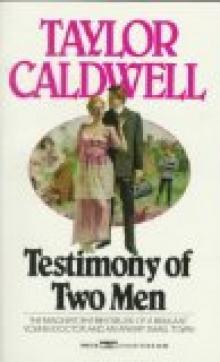 Testimony of Two Men
Testimony of Two Men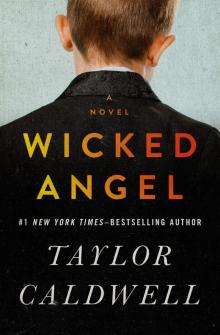 Wicked Angel
Wicked Angel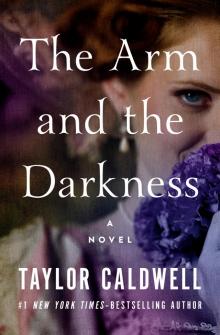 The Arm and the Darkness
The Arm and the Darkness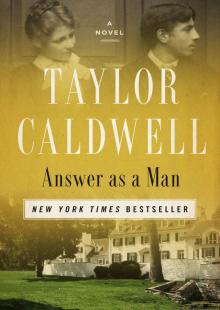 Answer as a Man
Answer as a Man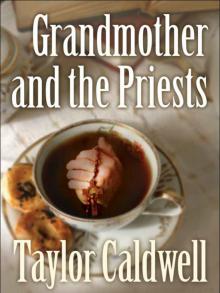 Grandmother and the Priests
Grandmother and the Priests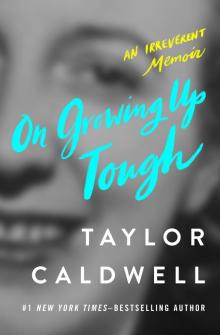 On Growing Up Tough: An Irreverent Memoir
On Growing Up Tough: An Irreverent Memoir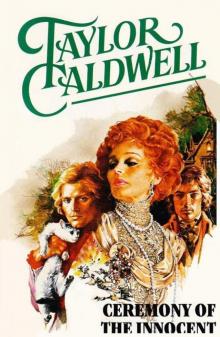 Ceremony of the Innocent
Ceremony of the Innocent The Listener
The Listener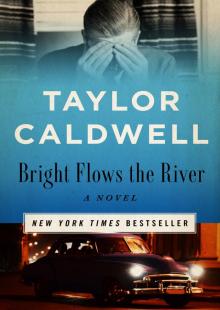 Bright Flows the River
Bright Flows the River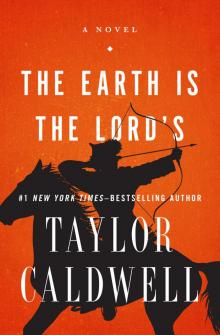 The Earth Is the Lord's
The Earth Is the Lord's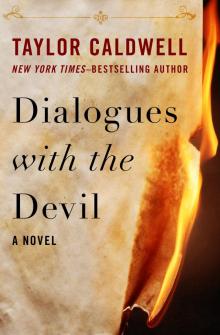 Dialogues With the Devil
Dialogues With the Devil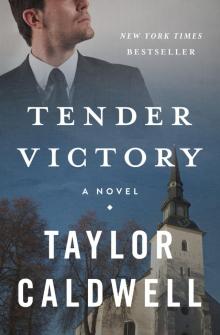 A Tender Victory
A Tender Victory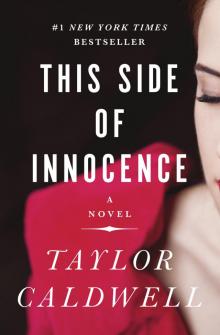 This Side of Innocence
This Side of Innocence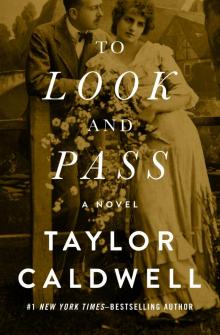 To Look and Pass
To Look and Pass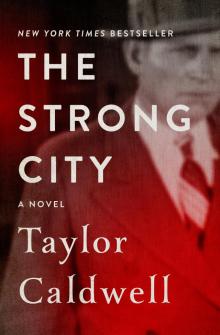 The Strong City
The Strong City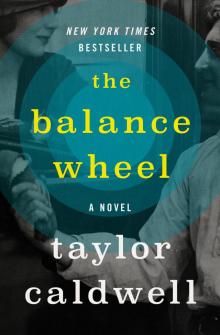 Balance Wheel
Balance Wheel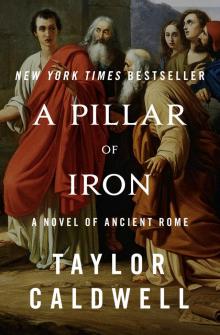 A Pillar of Iron: A Novel of Ancient Rome
A Pillar of Iron: A Novel of Ancient Rome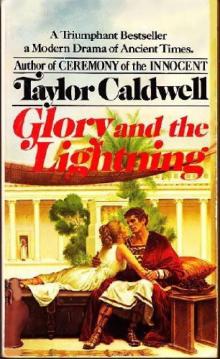 Glory and the Lightning
Glory and the Lightning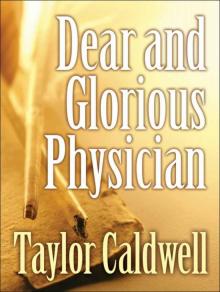 Dear and Glorious Physician
Dear and Glorious Physician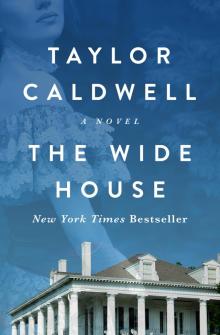 The Wide House
The Wide House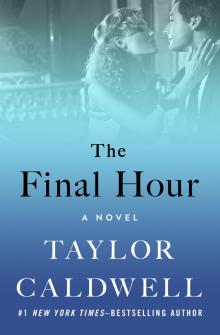 The Final Hour
The Final Hour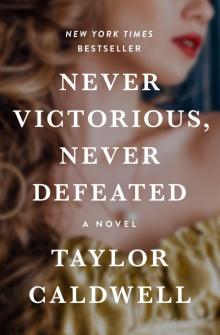 Never Victorious, Never Defeated
Never Victorious, Never Defeated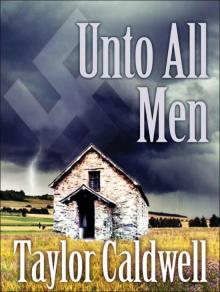 Unto All Men
Unto All Men The Turnbulls
The Turnbulls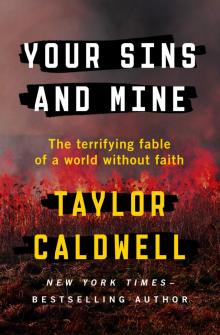 Your Sins and Mine: The Terrifying Fable of a World Without Faith
Your Sins and Mine: The Terrifying Fable of a World Without Faith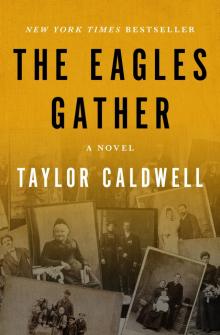 The Eagles Gather
The Eagles Gather Let Love Come Last
Let Love Come Last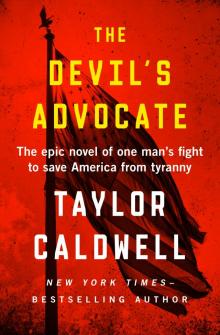 The Devil's Advocate: The Epic Novel of One Man's Fight to Save America From Tyranny
The Devil's Advocate: The Epic Novel of One Man's Fight to Save America From Tyranny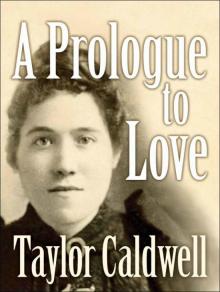 A Prologue to Love
A Prologue to Love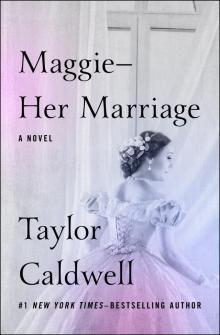 Maggie: Her Marriage
Maggie: Her Marriage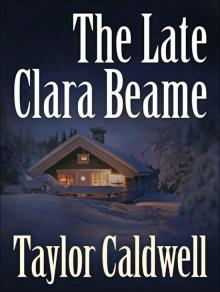 The Late Clara Beame
The Late Clara Beame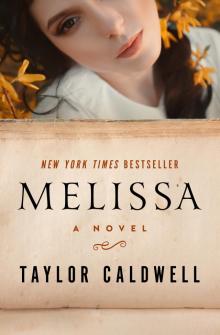 Melissa
Melissa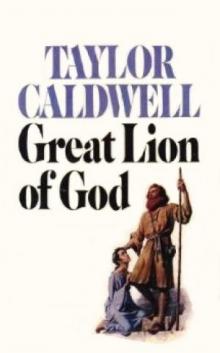 Great Lion of God
Great Lion of God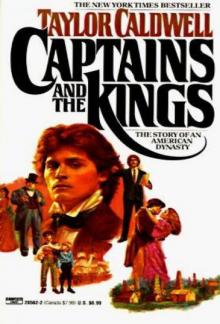 Captains and the Kings
Captains and the Kings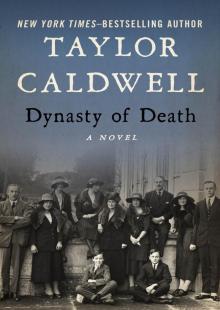 Dynasty of Death
Dynasty of Death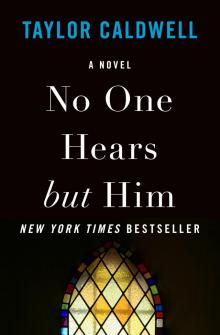 No One Hears but Him
No One Hears but Him The Sound of Thunder
The Sound of Thunder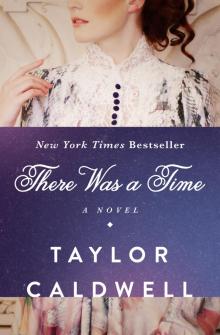 There Was a Time
There Was a Time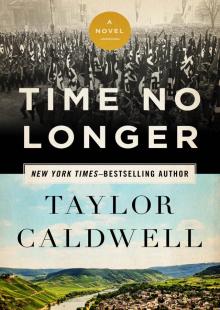 Time No Longer
Time No Longer I, Judas
I, Judas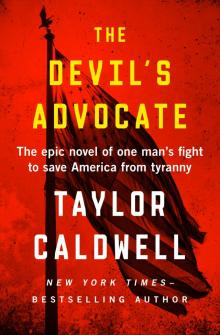 The Devil's Advocate
The Devil's Advocate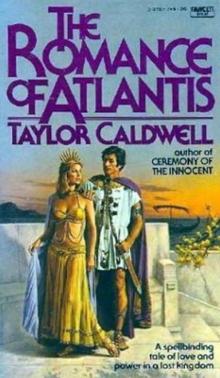 The Romance of Atlantis
The Romance of Atlantis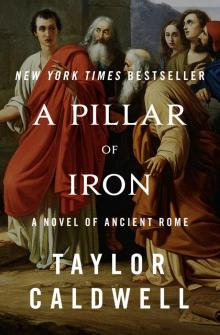 A Pillar of Iron
A Pillar of Iron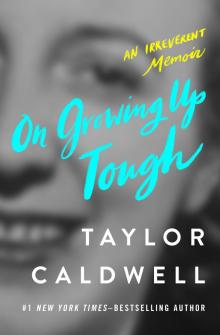 On Growing Up Tough
On Growing Up Tough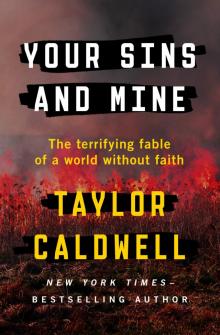 Your Sins and Mine
Your Sins and Mine